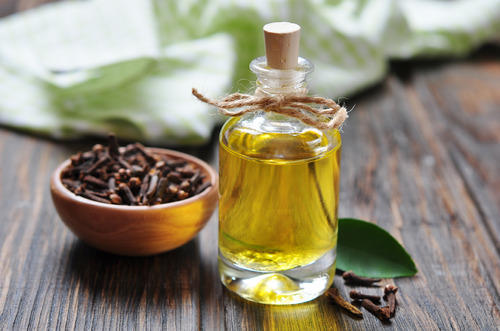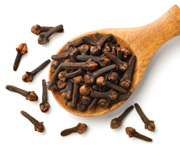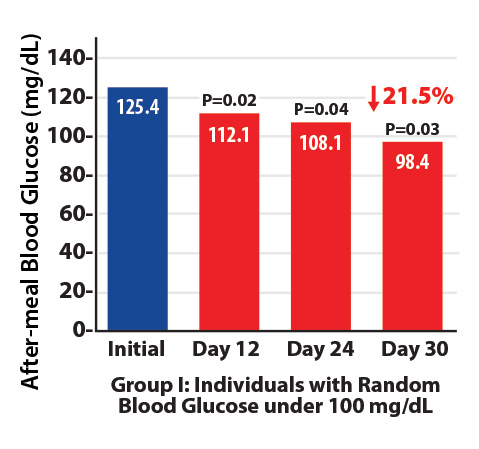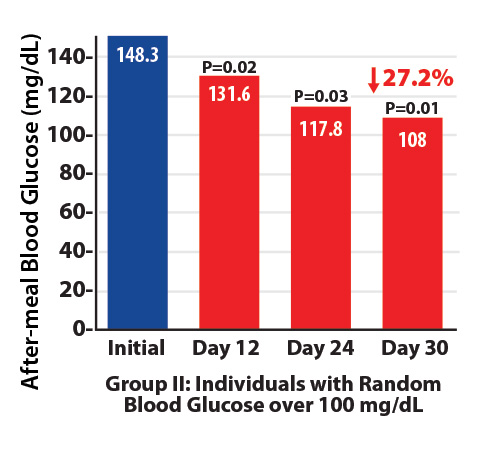Polyphenol-Rich Clove Extract Significantly Lowers After-Meal Blood Sugar By 21.5% In Healthy People And By 27.5% in Prediabetics
Source : Thailand Medical News Nov 30, 2019 6 years, 2 months, 3 days, 11 hours, 45 minutes ago
As a result of the human body ability to metabolize blood sugar breaking down, it sets off a cascade of harmful events that accelerates systemic aging. Even “high normal” blood sugar raises heart disease and stroke risk.
1-3 This loss of
glucose control motivated scientists to evaluate whether an
extract from cloves can
lower elevated blood sugar (
glucose).

In a new study, a standardized
clove extract was tested on healthy people and those with
prediabetes. The study results found lower
after-meal blood sugar in healthy adults and
prediabetics supplemented with polyphenol-rich
clove extract.
4
In the
prediabetic part of the study, fasting glucose levels were also lowered in the clove-supplemented participants.
These new findings indicate that a standardized
clove extract can benefit aging individuals who have less-than-optimal
glucose control. This is especially important for
prediabetics, who often suffer high
after-meal glucose for years before the onset of type II
diabetes or
diabetic complications.

About 25% of Americans over 65 have type II
diabetes, and about half of older Americans have
prediabetes.
5,6
Typically,
prediabetics may have “normal” fasting blood sugar levels, but often can’t properly handle
glucose after a meal. Unless they make substantial changes to their diet and lifestyle, up to
30% of
prediabetics will go on to develop type II
diabetes in only three to five years.
Even if progression to full-blown
diabetes does not occur,
prediabetes increases the risk for heart disease and stroke.
7,8 Younger adults (aged 25-44) are now more than twice as likely to have
diabetes and to be overweight than they were 30 years ago.
4,9
Numerous studies have shown that polyphenols, health-promoting nutrients found in plants, lower the risk of multiple diseases.
4,10-12 Diets
low in polyphenols are strongly associated with
increased risk of type II
diabetes.
13-15 These findings are driving the search for naturally occurring polyphenols
that can lower blood sugar and help prevent type II
diabetes and metabolic syndrome.
First Human Study on
Cloves
 Cloves
Cloves are dried flower buds of the
Syzygium aromaticum tree, which have been used as a spice for centuries or more.
One such particularly valuable
clove extract contains a minimum of 30% total polyphenols, including
gallic,
chlorogenic, and
ellagic acids,
catechin,
quercetin, and
eugenol, all of which have health benefits.
16-18
In past studies, this
clove extract demonstrated benefits in the liver, a key area of the body (along with fat and muscle) involved in
insulin resistance. (
Insulin resistance is an underlying abnormality that leads to
prediabetes and
diabetes.
4,18,19) These findings led scientists to hypothesize that
polyphenol-rich clove extract is likely to have benefits for
glucose metabolism in adult humans.
In a paper published in May 2019 in the journal
BMC Complementary and Alternative Medicine, researchers demonstrated blood-sugar-reducing effects of a polyphenol-rich
clove extract in healthy
and prediabetic people.
4
Fasting blood sugar levels have traditionally been used to identify those with, or at risk for, type II
diabetes. But
after-meal blood sugar (
glucose) levels are also an important indicator of disease risk.
4,20 Studies show that
after-meal blood sugar elevations are closely associated with cardiovascular disease and death.
21-23 In older
diabetics, large swings in post-meal
glucose also appear to contribute to impaired cognitive function.
24 An intervention that can delay or prevent elevated
after-
meal glucose is likely to help prevent blood sugar disturbances and
metabolic syndrome.
4
Medical researchers in the Department of Biochemistry at St. Thomas College in India evaluated before and
after meal
glucose levels in response to a
polyphenolic clove extract supplement.
4
 Two groups of people were studied for 30 days. Group I had normal after-meal glucose.
Two groups of people were studied for 30 days. Group I had normal after-meal glucose.
The researchers enrolled 13 healthy volunteers (aged 25-35), dividing them into two groups based on their initial pre-meal
glucose levels. Group I had
fasting glucose levels at or below 100 mg/dL (“normal”), and Group II had
prediabetic levels of 101-125 mg/dL.
4
On the first day, individuals ate a standard lunch immediately after the blood draw, and then right after lunch, all were given a 250 mg capsule of
clove extract. After two hours, a post-meal
glucose measurement was taken. This pattern was repeated daily for 30 days, with pre- and post-meal glucose measurements taken on days 12, 24, and 30.
 Group II had high after-meal glucose. Daily intake of 250 mg of clove extract reduced after-meal
Group II had high after-meal glucose. Daily intake of 250 mg of clove extract reduced after-meal
glucose levels by 21.5% in Group I and by 27.2% in Group II.
The study results found that in those with
normal fasting glucose,
clove supplementation had no impact on fasting
glucose (before-meal) sugar levels.
Howver in the
prediabetic group,
clove extract caused
significant reductions in pre-meal (fasting) glucose on days 24 and 30. This suggests that
clove extract could help maintain normal blood sugar levels throughout the day in people with
prediabetes those at highest risk for cardiovascular events and for developing type II
diabetes.
4
In both study groups,
clove extract significantly lowered
after-meal blood sugar levels. The average reduction in post-meal sugar levels over the 30-day study was
21.5% (from 125.4 mg/dL to 98.4 mg/dL) in the healthy group,
and 27.2% (from 148.3 mg/dL to 108 mg/dL) in the
prediabetes group.
4
These research results are impressive for several reasons. Unless one severely restricts the type and amount of food/drink ingested, there is an
after-meal spike in blood
glucose that silently inflicts cellular damage.
In those with higher
after-meal glucose surges, the damage translates into increased risks of disorders associated with
prediabetes. This includes micro-vascular complications such as neuropathy (burning feet), retinopathy (vision loss), and kidney impairment.
Prediabetic
glucose surges also increase macro-vascular damage that results in coronary and cerebral artery disorders that cause heart attack and ischemic stroke.
Scientists added polyphenol-rich
clove extract to cell cultures in a lab to study cell-level effects of the supplement.
4
Clove extract was found to work through
three different mechanisms as follows:
4
- Enhanced glucose uptake into muscle cells by up to 63%, providing them with metabolic fuel and removing sugar from circulation.
- Inhibition of glucose production in liver cells, an important site where excess sugar is released (gluconeogenesis).
- Inhibition of two digestive enzymes (alpha-glucosidase and alpha-amylase) from releasing glucose from compounds such as sucrose (table sugar) and starch.
These study findings reveal how this
clove extract can:
- Protect against after-meal blood sugar spikes in normal and prediabetic people,
- Decrease fasting glucose in prediabetics, and
- Increase glucose consumption by muscle cells.
No currently available drug can accomplish this.
Researchers have discovered that
extracts of cloves have immediate and lasting impacts on blood sugar.

They slow
glucose uptake from the intestine, reduce new
glucose production in the liver, and boost
glucose consumption by muscle cells all actions that help lower blood sugar.
In a new 2019 published study, 250 mg of a polyphenol-rich
clove extract, taken daily after lunch, significantly reduced
after-meal glucose spikes in healthy and prediabetic people. After-meal glucose spikes are closely associated with cardiovascular disease.
The
clove extract also lowered
pre-meal sugar levels in
prediabetics, protecting them from chronic blood sugar elevations that can lead to type II
diabetes.
But
clove extracts didn’t lower
pre-meal glucose in subjects with normal sugar levels, avoiding dangerous drops associated with some anti-
diabetes medications.
Taking a daily 250 mg
clove extract before a meal with the most starches or sugars has the potential to help maintain healthy
glucose metabolism.
Thailand Medical News warns that individuals currently receiving medications to control blood sugar should consult their doctors before adding ingredients like
clove extract to their diets and should closely monitor their blood sugar levels.
References
- Despres JP, Lamarche B, Mauriege P, et al. Hyperinsulinemia as an independent risk factor for ischemic heart disease. N Engl J Med. 1996 Apr 11;334(15):952-7.
- Garcia-Carretero R, Vigil-Medina L, Mora-Jimenez I, et al. Cardiovascular risk assessment in prediabetic patients in a hypertensive population: The role of cystatin C. Diabetes Metab Syndr. 2018 Sep;12(5):625-9.
- Mijajlovic MD, Aleksic VM, Sternic NM, et al. Role of prediabetes in stroke. Neuropsychiatr Dis Treat. 2017;13: 259-67.
- Mohan R, Jose S, Mulakkal J, et al. Water-soluble polyphenol-rich clove extract lowers pre- and post-prandial blood glucose levels in healthy and prediabetic volunteers: an open label pilot study. BMC Complement Altern Med. 2019 May 7;19(1):99.
- Available at: https://www.diabetes.org/diabetes-basics/statistics/. Accessed July 25, 2019.
- Available at: https://www.aarp.org/ppi/info-2018/the-facts-about-prediabetes-and-older-americans.html. Accessed July 25, 2019.
- Available at: https://www.health.ny.gov/diseases/conditions/diabetes/prediabetes/. Accessed May 15, 2019.
- Huang Y, Cai X, Mai W, et al. Association between prediabetes and risk of cardiovascular disease and all cause mortality: systematic review and meta-analysis. BMJ. 2016 Nov 23;355:i5953.
- Pilkington R, Taylor AW, Hugo G, et al. Are Baby Boomers healthier than Generation X? A profile of Australia’s working generations using National Health Survey data. PLoS One. 2014;9(3):e93087.
- Miranda AM, Steluti J, Fisberg RM, et al. Association between Polyphenol Intake and Hypertension in Adults and Older Adults: A Population-Based Study in Brazil. PLoS One. 2016;11(10):e0165791.
- Petrick JL, Steck SE, Bradshaw PT, et al. Dietary intake of flavonoids and oesophageal and gastric cancer: incidence and survival in the United States of America (USA). Br J Cancer. 2015 Mar 31;112(7):1291-300.
- Tresserra-Rimbau A, Guasch-Ferre M, Salas-Salvado J, et al. Intake of Total Polyphenols and Some Classes of Polyphenols Is Inversely Associated with Diabetes in Elderly People at High Cardiovascular Disease Risk. J Nutr. 2016 Mar 9.
- Wedick NM, Pan A, Cassidy A, et al. Dietary flavonoid intakes and risk of type 2 diabetes in US men and women. Am J Clin Nutr. 2012 Apr;95(4):925-33.
- Yeon JY, Bae YJ, Kim EY, et al. Association between flavonoid intake and diabetes risk among the Koreans. Clin Chim Acta. 2015 Jan 15;439:225-30.
- Zamora-Ros R, Forouhi NG, Sharp SJ, et al. The association between dietary flavonoid and lignan intakes and incident type 2 diabetes in European populations: the EPIC-InterAct study. Diabetes Care. 2013 Dec;36(12):3961-70.
- Issac A, Gopakumar G, Kuttan R, et al. Safety and anti-ulcerogenic activity of a novel polyphenol-rich extract of clove buds (Syzygium aromaticum L). Food and Function. 2015;6(3):842-52.
- Nm J, Rm R, G G, et al. Beyond the flavour: a de-flavoured polyphenol rich extract of clove buds (Syzygium aromaticum L) as a novel dietary antioxidant ingredient. Food Funct. 2015 Oct;6(10):3373-82.
- Jose S, Ratheesh M, Asha I, et al. Hepatoprotective effect of clove bud polyphenols (Syzygium aromaticum L.) (Clovinol®) by modulating alcohol induced oxidative stress and inflammation. Journal of Food Research. 2018;7(1):10-20.
- Kleemann R, van Erk M, Verschuren L, et al. Time-resolved and tissue-specific systems analysis of the pathogenesis of insulin resistance. PLoS One. 2010 Jan 21;5(1):e8817.
- Nathan DM, Davidson MB, DeFronzo RA, et al. Impaired fasting glucose and impaired glucose tolerance: implications for care. Diabetes Care. 2007 Mar;30(3): 753-9.
- Barclay AW, Petocz P, McMillan-Price J, et al. Glycemic index, glycemic load, and chronic disease risk--a meta-analysis of observational studies. Am J Clin Nutr. 2008 Mar;87(3):627-37.
- Ceriello A. Postprandial hyperglycemia and diabetes complications: is it time to treat? Diabetes. 2005 Jan;54(1):1-7.
- Cavalot F, Petrelli A, Traversa M, et al. Postprandial blood glucose is a stronger predictor of cardiovascular events than fasting blood glucose in type 2 diabetes mellitus, particularly in women: lessons from the San Luigi Gonzaga Diabetes Study. J Clin Endocrinol Metab. 2006 Mar;91(3):813-9.
- Abbatecola AM, Rizzo MR, Barbieri M, et al. Postprandial plasma glucose excursions and cognitive functioning in aged type 2 diabetics. Neurology. 2006 Jul 25;67(2):235-40.
- Kato M, Tani T, Terahara N, et al. The Anthocyanin Delphinidin 3-Rutinoside Stimulates Glucagon-Like Peptide-1 Secretion in Murine GLUTag Cell Line via the Ca2+/Calmodulin-Dependent Kinase II Pathway. PLoS One. 2015;10(5):e0126157.





